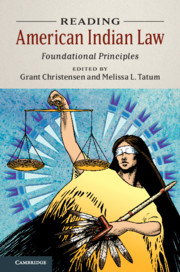Book contents
- Reading American Indian Law
- Reading American Indian Law
- Copyright page
- Dedication
- Contents
- Editors and Contributors
- Preface
- Acknowledgments
- Introduction
- Part I Core Concepts
- 1 Marshalling Past and Present: Colonialism, Constitutionalism, and Interpretation in Federal Indian Law
- 2 The Algebra of Federal Indian Law: The Hard Trail of Decolonizing and Americanizing the White Man’s Jurisprudence
- 3 Red: Racism and the American Indian
- 4 (Tribal) Sovereignty and Illiberalism
- Part II Voices
- Part III Property
- Part IV (Mis)Understandings
- Book part
- References
4 - (Tribal) Sovereignty and Illiberalism
from Part I - Core Concepts
Published online by Cambridge University Press: 11 December 2019
- Reading American Indian Law
- Reading American Indian Law
- Copyright page
- Dedication
- Contents
- Editors and Contributors
- Preface
- Acknowledgments
- Introduction
- Part I Core Concepts
- 1 Marshalling Past and Present: Colonialism, Constitutionalism, and Interpretation in Federal Indian Law
- 2 The Algebra of Federal Indian Law: The Hard Trail of Decolonizing and Americanizing the White Man’s Jurisprudence
- 3 Red: Racism and the American Indian
- 4 (Tribal) Sovereignty and Illiberalism
- Part II Voices
- Part III Property
- Part IV (Mis)Understandings
- Book part
- References
Summary
Sovereignty and Illiberalism: introduces the reader to the different set of rights that are controlling upon tribal governments. The Constitution does not apply in Indian country. This means that tribes may use their inherent sovereignty to do things that appear to intrude on the legal protections of their members. Riley’s piece confronts this tension directly by exploring competing sympathies: tribal sovereignty and civil rights.
- Type
- Chapter
- Information
- Reading American Indian LawFoundational Principles, pp. 93 - 116Publisher: Cambridge University PressPrint publication year: 2019
References
Further Reading
- 1
- Cited by

